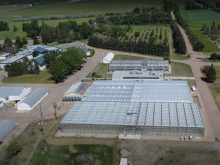Two Saskatchewan elk farms have filed a class-action lawsuit claiming
Agriculture Canada negligently allowed diseased animals into the
country.
Blane and Glen Heitt of Unity, with Rick Alsager of Maidstone, filed
the suit in Regina on Nov. 28.
Blane Heitt said they believe the government knew that diseases like
chronic wasting disease and bovine tuberculosis existed in the 1970s in
American herds, but still allowed the animals to be imported into
Canada.
He also said adequate tests were not done before their import as no
Read Also

Alberta crop diversification centres receive funding
$5.2 million of provincial funding pumped into crop diversity research centres
reliable tests were available at the time.
When CWD hit two years ago, he said his elk plummeted in value.
“The animals became worthless after CWD hit,” said Heitt.
One of his bred elk cows once sold for $20,000. He recently sold his
bulls for $600-$700 and calves for $100.
Heitt, a grain farmer who also holds an off-farm job, sold off his
250-head herd. He butchered the 40 remaining animals a month ago and
sold the meat.
All heads were sent away for CWD testing, he said.
“I’ve been feeding them for two years for nothing,” said Heitt.
He plans to meet with other interested elk and deer farmers from
Saskatchewan and Alberta later this month, to see if they are willing
to share the costs of the suit.
Heitt hopes for a cash settlement to cover his losses. “It will take a
long time to come back.”
CWD, a fatal brain disorder, has affected 41 herds of farmed elk, all
in Saskatchewan, except one in Alberta. It has also been found in
farmed deer in Alberta and wild deer in Saskatchewan.
Drought and disease have also hit the industry hard, with many
producers scrambling to find feed for their animals. Some have
threatened to turn their animals out into the wild rather than watch
them starve.
On Dec. 5, the provincial SPCA seized a herd of 200 elk from a Wilkie
farm and filed charges under the animal protection and cruelty to
animals acts.
Ernie Olfert of the SPCA said some animals had already died, with the
remainder receiving veterinary care. They were moved to an
SPCA-approved farm.
Olive noted investigations and complaints into alleged livestock
offences have increased this year, up to more than 400 from the usual
350.














